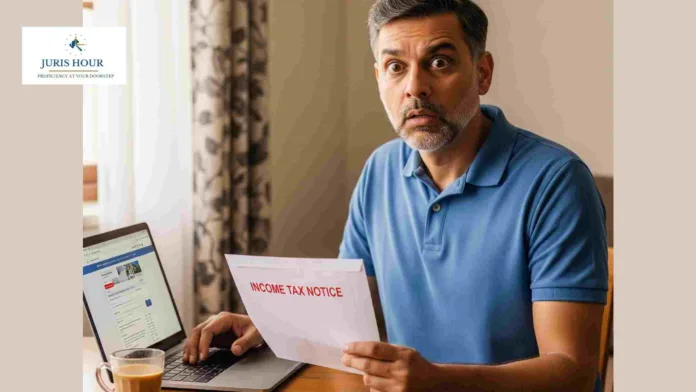In India, when the Income Tax Department detects discrepancies, non-compliance, or any irregularities in a taxpayer’s Income Tax Return (ITR), it issues an official communication known as an income tax notice. These notices are sent under various provisions of the Income Tax Act and require prompt attention to avoid potential penalties.
What Is an Income Tax Notice?
An income tax notice is an official communication sent by the Income Tax Department to inform a taxpayer about discrepancies in filing, missing information, delayed submissions, or undeclared income. These notices can be sent regardless of whether a taxpayer has filed their return. In recent times, fake tax notices have become increasingly common, so verifying the authenticity of any communication on the official Income Tax Portal is crucial.
Once verified, the taxpayer must respond within 30 days of receiving the notice. Failure to respond can lead to penalties up to ₹10,000. It is essential to understand the reason for the notice and submit replies exclusively via the official portal to avoid further complications.
Types of Income Tax Notices
1. Intimation Notice – Section 143(1)
This is an automated notice issued after a preliminary assessment of the taxpayer’s ITR. It compares the details provided in the return with the department’s data. The intimation reflects whether the return has been accepted as filed, if a refund is due, or whether discrepancies have resulted in a tax liability. It is non-penal and serves as a summary of the income declared.
2. Assessment Inquiry Notice – Section 142
- Section 142(1): Issued when the Assessing Officer (AO) suspects that the taxpayer has not filed a return or omitted important information, even if a return has been submitted.
- Section 142(2): The AO may request the taxpayer to submit books of accounts or other documents to verify the claims made in the return. This enables the AO to examine income beyond what has been declared.
- Section 142(3): Requests written explanations regarding various financial matters, including assets, liabilities, business activities, or undisclosed income sources.
3. Scrutiny Notice – Section 143(2)
This notice is sent when the AO is unsatisfied with the return or detects missing information. It allows the department to conduct a thorough examination of the return, typically served within three months from the end of the financial year in which the ITR was filed.
4. Income Escaping Assessment Notice – Section 148
If the AO believes that certain income was not assessed earlier, a Section 148 notice is issued. This empowers the department to reassess the taxpayer’s income for the relevant assessment year.
5. Demand Notice – Section 156
When tax, interest, penalty, fine, or any other sum is payable by the taxpayer, a demand notice is issued under Section 156. It specifies the exact amount due for payment.
How to Respond to an Income Tax Notice
To handle an income tax notice properly and avoid penalties, taxpayers should follow these steps:
- Read the Notice Carefully: Understand the specific reason for the notice.
- Verify Authenticity: Log in to the official Income Tax Portal to confirm the notice is legitimate.
- Access the Notice: Go to the section ‘Pending Action > e-Proceedings’ on the portal to retrieve the details.
- Prepare a Response: Draft a clear explanation addressing the notice’s concerns, and attach all necessary supporting documents.
- Submit the Reply Online: Upload your response through the Income Tax Portal and retain the acknowledgement ID as proof of submission.
- Follow Up: Regularly monitor the portal and your registered email for further communications from the Income Tax Department.
Conclusion
Income Tax Notices are serious communications that demand immediate and accurate responses. Taxpayers are urged to act swiftly, verify authenticity, and respond through the official channels to ensure compliance and avoid heavy penalties. Staying informed and vigilant is key to navigating the complexities of income tax administration.

